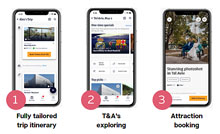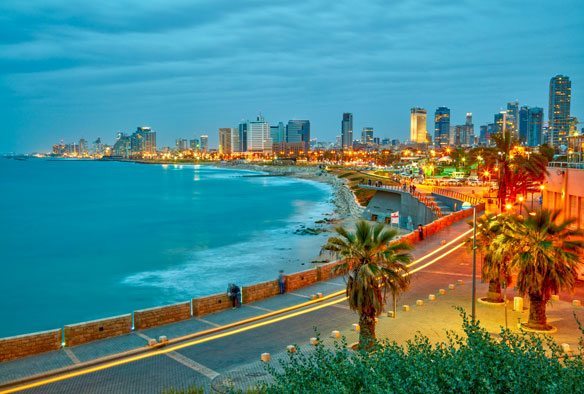
Time to start swimming
Israel taps into technology to turn travel around

Special to Canadian Travel Press
As Gal Hana sees it, while the industry may have some time on its collective hands, that down time is the perfect opportunity to improve processes and efficiency. The Consul & Director of Tourism Canada for the Israel Ministry of Tourism also points out that technology will play a key role in these areas.
It has been a while since the last time we talked. I know that Israel has had a spike in COVID-19 cases, I’m wondering if you can give CTP’s readers an update on the situation as it relates to the country’s tourism industry?
As many of your readers are aware, Israel was one of the first countries that got hit by the second wave of the pandemic. Just like more countries nowadays, the numbers spiked very fast, and we needed respond and go back with restrictions and a lockdown. Thankfully, the fast response quickly lowered the numbers of new cases and brought Israel back on the track.
These days, we are gradually and responsibly lifting those restrictions. Moreover, there are signs of optimism with approval for business travel to Israel and the recent decision to make Eilat, our sun escape city and the Dead Sea region Covid-free sites that people can visit without quarantine and restrictions.
I believe that this creative approach is the way to deal with the situation. The industry implemented protocols and procedures to guarantee people’s safety but also their satisfaction and I believe that this combination will make the recovery process shorter then other destinations.
Following up on this. What’s the Ministry of Tourism’s plan going forward, both overall and as it relates to Canada specifically?
We are formulating our 2021 strategy based on an agile approach as things evolve rapidly and we need to reshape and adjust constantly, especially these days with the pandemic.
In recent months, our goal was to keep people inspired and the fact is that despite the pandemic we were still very active with digital SM campaigns, FB and Instagram events, and webinars.
The combination of being in the top of mind of the industry and the great partnerships and relationships with the industry main stakeholders will be translated to our recovery plan.
We aim to focus our efforts in Quebec and Ontario with the direct flights opportunities as well as recent improvements and investments in Israel. I am sure that you heard about the recent agreements with the UAE, Bahrain and Sudan. This are still too big to understand outcomes but in regards for tourism it has a great potential that we are inquiring these days.
Its our advantage that Israel is world renown as innovative and creative, so we translate this to our day-to-day work.
Regarding Canada, back in February we were the first office to identify the need of virtual capabilities as well as in-house webinars capabilities and we got into Zoom when most didn’t know about that.
On top of that we did a travel-tech and trends webinar to raise the awareness to the subject and we held the first ever Israel virtual trade show in the world here in Canada and today we are promoting Israel travel-tech ecosystem here in Canada. I hope that this forward thinking and leveraging the momentum of all of the above will lead us in a quick and quality recovery plan.
Now, Israel has always been innovative in the area of technology. And I believe that there are connections between the country’s technology and travel/tourism industries? Can you talk a bit about this – how has this come about and how it benefits both industry sectors?
They way I see it there are two alternatives – trying to survive and disappear or adjust and evolve. It’s either you focus on staying alive and keeping your head above water, and probably sink or you decide to understand the stream and starting to swim.
Throughout history, Israel has experienced constant turbulence, so we were forced to develop an approach that can identify the possibilities in impossible situations.
This is how we developed the most innovative technologies – security, HLS, agriculture, food-tech and traveltech.
The tourism industry should use this time to better itself, to improve processes, to increase profitability and efficiency and this is where technology is more relevant than ever.
Imagine a travel agent who can depict in high detail that includes a virtual personal tour of the client’s itinerary; taking the guest into the airport, into the hotel and to different sites in the destination.
And by doing this, the agent is showcasing the safety and sanitary protocols, choosing with his client the best attraction he wishes to visit and even choosing from the menu what the client wants for breakfast.
The sense of safety will be high and the satisfaction even more because the expectations were matched.
Tour operators are booking thousands of hotel nights everyday and those prices change constantly. if a business technologically keep renegotiating the price and automatically rebook the hotels when it is worthy you can increase the profitability tremendously.
And those are only two examples.
The future needs will be new to the industry – hotels would need to guarantee the quality of the air in main halls, to better know the clients in addressing their needs as the personal interaction will reduce to minimize any risk.
The quote “predicting rain doesn’t help but building arks does” is commonly attributed to Warren Buffet, probably one of the most important business leaders in the world. In that regards, the tourism industry must implement technology to stay in the market.
 Again, following up, I’m wondering if you can give CTP’s readers of some examples of tech companies developing tourism-related products and programs?
Again, following up, I’m wondering if you can give CTP’s readers of some examples of tech companies developing tourism-related products and programs?
The Travel-tech ecosystem in Israel is diverse and interesting and my goal is to reach out and increase the awareness in the Canadian industry. I will share only few examples of creative and innovative companies as there are many, depending what is the businesses needs. Nowadays due to the current market situation, hotels price fluctuations have become more aggressive and more frequent due a large number of factors such as competition between wholesalers, occupancy rates, cancellations and uncertainty in the market.
 PRUVO company Revenue Maker is an A.I-driven solution that helps hotel resellers, such as Online Travel Agencies and bed-banks, increase their hotel post-booking profitability by 36% by rebooking the price of a hotel reservation they already sold once the net price drops. When I spoke to Pruvo CDO, Doron Nadivi, he mentioned that: “sometimes post-booking price drops as much as 72% off the original price.”
PRUVO company Revenue Maker is an A.I-driven solution that helps hotel resellers, such as Online Travel Agencies and bed-banks, increase their hotel post-booking profitability by 36% by rebooking the price of a hotel reservation they already sold once the net price drops. When I spoke to Pruvo CDO, Doron Nadivi, he mentioned that: “sometimes post-booking price drops as much as 72% off the original price.”
Another interesting company is ROUTIER company which provide a touchless guest communication to increase revenue, decrease costs and better operational efficiency. Their guest communication tool empowers the engagement with the guests in real time, increasing the satisfaction rate and on the same time utilizes the hotel operations.

BRIDGIFY is a great innovative company which focuses specializing in customized in-destinations tours and activities for travel retailers while improving the client experience. Amit Shamni, the CEO, highlight that they provide hotel-chains a personalized travel platform for their customers. With guests’ feedbacks, besides helping travelers to travel smartly, Bridgify creates new streams of revenues by helping travel retailers offer better suggestions for second-tier products and external Tours and Activities.
So, how do these initiatives, products, programs benefit Canadian travel agents and tour operators? Are their benefits? If so, what are they?

The tourism sector is probably the industry that has been hurt the most during the pandemic. On the other hand, technology companies flourish as their products are now even more needed then in the past. The combination of the need with the supply of Israeli companies holds a significant blue ocean opportunity both for Israel and Canada.
By connecting companies with the Israeli traveltech solutions they can not only keep their head above water but prepare their business to the future trends and needs. As they say uncertainty is the only certainty.
The question of how and what will be the future trends despite that it is interesting, when it comes to business it is not relevant. It is an unknown and a sustainable business should have the set of tools and forward thinking to welcome any kind of challenges.
Recognizing this and collaborating with travel tech companies is a first step of recovery for the travel industry.
Probably should have asked this earlier, but I’m wondering two things. First, how has technology changed the tourism industry – both in general and specifically as it relates to Israel? And, secondly, how do you see technology changing the industry going forward?
Technology changed the tourism Industry in more ways that we can imagine.
Not so long-ago people travelled once every few years if anything, not to think of traveling to multiple destination in one year. nowadays operational costs dropped, flights process went down, the globalization opened more destination than ever before and people appreciate experiences and memories over commodities this days. however, if we thought that the technology quantum leap in travel already happened, the pandemic taught us otherwise – there is nothing stagnant.
The next generation of travel will be one that clients can virtually experience destination to tailor maid their itinerary – virtually walk in the Tel-Aviv promenade or stroll within the old city of Jerusalem.
New ways to efficiently communicate with your guests to leverage their stay to business needs while highlighting their experience and satisfaction.
Tech platforms will connect different tourists that share a passion for lower cost, better experience. As remotely working became common, people will search a relaxing but exhilarating place to work. The need for a more relax approach to embrace a place and the countryside will raise as people will seek an escape from the metropolitans.
The main thing is that everything will be more planned – both the supplier side and the consumer side.
The client will know everything about the destination and hotel but also vice versa – all the info will be with the hotels, sites and attractions and the competition will be upon the best performance when it comes to the client satisfaction.
Last question. The industry around the world continues to struggle, I’m just wondering whether you’re optimistic or pessimistic about the future? And why?
My late grandfather, who survived the holocaust, the establishment of Israel, and the wars, always told me that during all those times when many thought it was the end of the world, he never gave up.
Desmond Tutu said that “Hope is being able to see that there is light despite all of the darkness.”
And I can’t stop thinking of my late grandfather sharing with me his vision of hope when I think about the current time. I believe that it always seems that every significant crisis is the end of the world but realistically it is another challenge that we need to face as a society.
The more important question that you should ask me is do you think that we can overcome that challenge better than before – and for that, my answer is crystal clear – I have no doubt.
I see kind people helping one to other, expressing solidarity, focusing on the common good and I am more optimistic than ever.
Actually, as Israel consul of tourism I think that is our advantage point, after such a time, visiting in one of the most meaningful destination in the world would be more overwhelming than ever.

